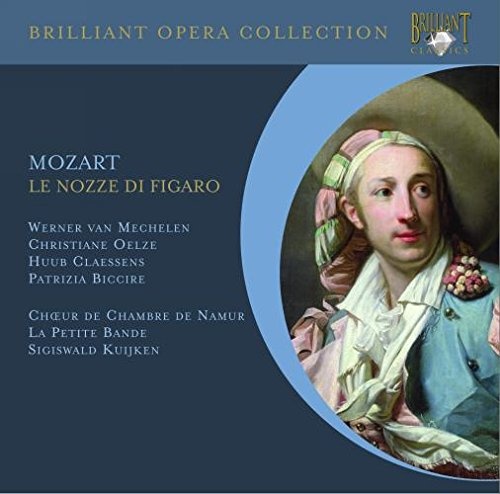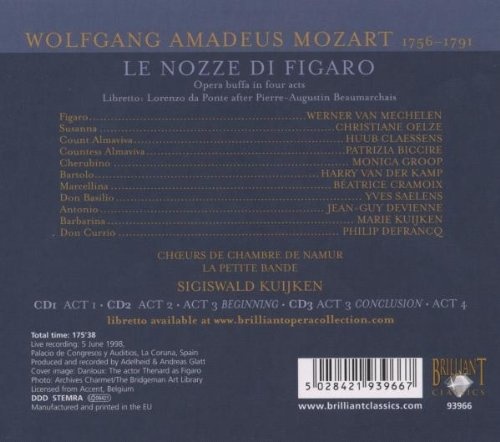
classical music distribution


(Produkt nie został jeszcze oceniony)
kompozytor
Mozart, Wolfgang Amadeus
tytuł
Mozart: Le Nozze di Figaro
wykonawcy
La Petite Bande;
Kuijken, Sigiswald
Kuijken, Sigiswald
nr katalogowy
93966
opis
In a letter to his father on 13 October 1781, Mozart wrote, ‘Why do Italian comic operas give such pleasure everywhere – in spite of their miserable libretti…?’ Because the music reigns supreme: when one listens to it all else is forgotten. Why an opera is sure of success when the plot is well worked out, the words written solely for the music and not shoved in here and there to suit some miserable rhyme… The best thing of all is when a good composer, who understands the stage and is talented enough to make sound suggestions, meets an able poet, that true phoenix.’Two years before he had met Lorenzo da Ponte, Mozart’s frustration with the present condition of opera had reached boiling point. The collaboration between the two men produced three of the greatest operas in the repertoire – Figaro, Don Giovanni and Così fan tutte. Adapting the second play in Beaumarchais’ trilogy, da Ponte skilfully navigated a risky path through the plot that had lead to Emperor Joseph II (da Ponte had become court poet thanks to an introduction from Antonio Salieri) banning it.
nośnik
CD
x 3
gatunek
Muzyka klasyczna
producent
Brilliant Classics
data wydania
13-11-2019
EAN / kod kreskowy
5028421939667

(Produkt nie został jeszcze oceniony)
cena 75,00 zł
lubProdukt na zamówienie
Wysyłka ustalana indywidualnie.
Darmowa wysyłka dla zamówień powyżej 300 zł!
Darmowy kurier dla zamówień powyżej 500 zł!
sprawdź koszty wysyłkiProduktu jeszcze nie zrecenzowano, chcesz być pierwszy?
Klienci, którzy kupili ten produkt, kupili również
różni kompozytorzy
Previn: 2 Little Serenades, Gould: Sonata for violin & piano, Bach: Partita, Pärt: Spiegel im Spiegel
SM 176
Elfman, Danny, Hailstork, Adolphus
Elfman: Violin Concerto; Hailstork: Piano Concerto
8.559925
Pozostałe płyty tego kompozytora
Mozart, Wolfgang Amadeus, Bach, Carl Philipp Emanuel
Mozart: Mass in C Minor - C.P.E. Bach: Heilig ist Gott
CKD 721
różni kompozytorzy
The Royal Opera - Great Performances, Recorded live 1955-1997 Otello; Don Carlos; Un Ballo in Maschera, Madama Butterfly, Lucia Di Lammermoor, Don Giovanni; Cosi Fan Tutte, Parsifal; Die Meistersinger von Nürnberg, Alceste, Der Rosenkavalier
OA CD9024 D
Liszt, Franz, Wagner, Richard, Mozart, Wolfgang Amadeus
Kit Armstrong plays Wagner, Liszt and Mozart
756604
różni kompozytorzy
Most Famous Piano Concertos - Tchaikovsky, Beethoven, Mozart, Brahms
PH 13033
Pozostałe płyty tego wykonawcy
Mendelssohn, Felix, Schneider, Friedrich
Schneider: Symphony No. 17 / Mendelssohn: Violin Concerto
CPO 999 932-2
Bach, Johann Sebastian, Buxtehude, Dietrich
Bach: Cantatas BWV 19 & 130; Buxtehude: Cantata BuxWV 10
CDB 003
Pergolesi, Giovanni Battista
WYCOFANY Pergolesi: Livietta e Tracollo, La Serva
DVD TDK LTSP
Napisz recenzję dla: Mozart: Le Nozze di Figaro
Zapytaj o dostępność produktu
Twoje zapytanie:
Odpowiemy na adres:
Produkt został dodany do koszyka

Mozart, Wolfgang Amadeus
Mozart: Le Nozze di Figaro
1 szt






































